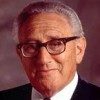World War I is much more typical of the wars of history than World War II — the kind of war you look back afterward and say, “What the hell were we fighting for? Why did all these millions of people have to die? Was it really worth it to get rid of the Austro-Hungarian Empire, that we wiped out an entire generation, and tore up half the continent? Was the War of 1812 worth fighting? The Spanish-American War? What the hell were these people fighting for?”
George R. R. Martin (b. 1948) American author and screenwriter [George Raymond Richard Martin]
Interview (2014-04-23) by Mikal Gilmore, “The Rolling Stone Interview,” Rolling Stone
(Source)
Quotations about:
warfare
Note not all quotations have been tagged, so Search may find additional quotes on this topic.
When he was a boy, he’d read books about great military campaigns, and visited museums and had looked with patriotic pride at the paintings of famous cavalry charges, last stands, and glorious victories. It had come as rather a shock, when he later began to participate in some of these, to find that the painters had unaccountably left out the intestines. Perhaps they just weren’t very good at them.
The task of war is to destroy life; the task of peace is to create it; to organize labor so that it shall not incapacitate men for leisure; to establish justice as a foundation for personality; to unfold in men the capacity for noble joy and profound sorrow; to liberate them for the passion of love, the perception of beauty, the contemplation of truth. Of all these things war is the enemy.
G. Lowes Dickinson (1862-1932) British political scientist and philosopher [Goldsworthy "Goldie" Lowes Dickinson]
“The War and the Way Out: A Further Consideration,” sec. 3, Atlantic Monthly (1915-04)
(Source)
History. We want to find moral lessons in it, but its only lessons are of politics, military art, etc.
Joseph Joubert (1754-1824) French moralist, philosopher, essayist, poet
Pensées [Thoughts], 1806 [tr. Auster (1983)]
(Source)
I have been unable to find an analog in other translations, or in the original French.
The invention of gunpowder and the constant improvement of firearms are enough in themselves to show that the advance of civilization has done nothing practical to alter or deflect the impulse to destroy the enemy, which is central to the very idea of war.
[Die Erfindung des Pulvers, die immer weiter gehende Ausbildung des Feuergewehrs zeigen schon hinreichend, dase die in dem Begriff des Krieges liegende Tendenz zur Vernichtung des Gegners auch faktisch durch die zunehmende Bildung keineswegs gestört oder abgelenkt worden ist.]
Karl von Clausewitz (1780-1831) Prussian soldier, historian, military theorist
On War [Vom Kriege], Book 1, ch. 1 “What Is War? [Was ist der Krieg?],” § 3 (1.1.3) (1832) [tr. Howard & Paret (1976)]
(Source)
(Source (German)). Alternate translations:The invention of gunpowder, the constant progress of improvements in the construction of firearms are sufficient proofs that the tendency to destroy the adversary which lies at the bottom of the conception of war, is in no way changed or modified through the progress of civilisation.
[tr. Graham (1873)]The invention of gunpowder and the advances continually being made in the development of firearms, in themselves show clearly enough that the demand for the destruction of the enemy, inherent in the theoretical conception of war, has been in no way actually weakened or diverted by the advance of civilization
[tr. Jolles (1943)]
Act like the person you are, not the way they make you act.
[Cada uno ha de obrar como quien es, no como le obligan.]
Baltasar Gracián y Morales (1601-1658) Spanish Jesuit priest, writer, philosopher
The Art of Worldly Wisdom [Oráculo Manual y Arte de Prudencia], § 165 (1647) [tr. Maurer (1992)]
(Source)
On waging war honorably. (Source (Spanish)). Alternate translation:All men ought to act according to what they themselves are, and not to what others are.
[Flesher ed. (1685)]Every one must needs act as he is, not as others would make him to be.
[tr. Jacobs (1892)]Each must act for what he is, and not for what he is held.
[tr. Fischer (1937)]
Any historian of warfare knows it is in good part a comedy of errors and a museum of incompetence; but if for every error and every act of incompetence one can substitute an act of treason, many points of fascinating interpretation are open to the paranoid imagination. In the end, the real mystery, for one who reads the primary works of paranoid scholarship, is not how the United States has been brought to its present dangerous position but how it has managed to survive at all.
It is too true, however disgraceful it may be to human nature, that nations in general will make war whenever they have a prospect of getting anything by it; nay, absolute monarchs will often make war when their nations are to get nothing by it, but for the purposes and objects merely personal, such as thirst for military glory, revenge for personal affronts, ambition, or private compacts to aggrandize or support their particular families or partisans. These and a variety of other motives, which affect only the mind of the sovereign, often lead him to engage in wars not sanctified by justice or the voice and interests of his people.
John Jay (1745-1829) American statesman, diplomat, abolitionist, politician, Chief Justice (1789-1795)
The Federalist #4 (7 Nov 1787)
(Source)
The chief reason warfare is still with us is neither a secret death-wish of the human species, nor an irrepressible instinct of aggression, nor, finally and more plausibly, the serious economic and social dangers inherent in disarmament, but the simple fact that no substitute for this final arbiter in international affairs has yet appeared on the political scene.
Hannah Arendt (1906-1975) German-American philosopher, political theorist
“On Violence,” Crises of the Republic (1972)
(Source)
HENRY: Once more unto the breach, dear friends, once more;
Or close the wall up with our English dead!
In peace, there’s nothing so becomes a man,
As modest stillness and humility:
But when the blast of war blows in our ears,
Then imitate the action of the tiger;
Stiffen the sinews, summon up the blood,
Disguise fair nature with hard-favored rage ….William Shakespeare (1564-1616) English dramatist and poet
Henry V, Act 3, sc. 1, l. 1ff (3.1.1-8) (1599)
(Source)
We fought a military war; our opponents fought a political one. We sought physical attrition; our opponents aimed for our psychological exhaustion. In the process we lost sight of one of the cardinal maxims of guerrilla war: the guerrilla wins if he does not lose. The conventional army loses if it does not win.
Henry Kissinger (1923-2024) German-American diplomat
“The Viet Nam Negotiations,” Foreign Affairs (Jan 1969)
(Source)
Sometimes paraphrased as "A conventional army loses if it does not win. The guerrilla army wins if he does not lose."
It is no longer a choice, my friends, between violence and nonviolence. It is either nonviolence or nonexistence. And the alternative to disarmament, the alternative to a greater suspension of nuclear tests, the alternative to strengthening the United Nations and thereby disarming the whole world, may well be a civilization plunged into the abyss of annihilation, and our earthly habitat would be transformed into an inferno that even the mind of Dante could not imagine.
Martin Luther King, Jr. (1929-1968) American clergyman, civil rights leader, social activist, preacher
“Remaining Awake Through a Great Revolution,” National Cathedral, Washington, DC (31 Mar 1968)
(Source)
You judge a war according to who is in the right as long as you have no interest in the outcome; if you’re one of the participants, or if the result is going to have a major effect on you, then you have to create the moral principles that put you in the right — that’s nothing new, everyone knows it.
We have been the cowards, lobbing cruise missiles from 2,000 miles away. That’s cowardly. Staying in the airplane when it hits the building, say what you want about it, that’s not cowardly. Stupid maybe, but not cowardly.
The key lesson to me of Vietnam is that you cannot outlast insurgents in their own country. This idea that when Bush says, “Well, we can’t say we’re going to pull out in six months because they’ll only have to wait six months and a day” — they’ll wait a hundred friggin’ years if they have to!
One of the things that I noticed in war was how difficult it was for our soldiers, at first, to realize that there are no rules to war. Our men were raised in sports, where a referee runs a football game, or an umpire a baseball game, and so forth.
‘Twas blow for blow, disputing inch by inch,
For one would not retreat, nor t’other flinch.
At the present day, civilized opinion is a curious mental mixture. The military instincts and ideals are as strong as ever, but they are confronted by reflective criticisms which sorely curb their ancient freedom. Innumerable writers are showing up the bestial side of military service. Pure loot and mastery seem no longer morally allowable motives, and pretexts must be found for attributing them solely to the enemy.
William James (1842-1910) American psychologist and philosopher
“The Moral Equivalent of War” (1906)
(Source)
Maybe we should always show pictures. Bin Laden, pictures of our wounded service people, pictures of maimed innocent civilians. We can only make decisions about war if we see what war actually is — and not as a video game where bodies quickly disappear, leaving behind a shiny gold coin.
You can’t say civilization don’t advance, however, for in every war they kill you in a new way.
Will Rogers (1879-1935) American humorist
Column (1929-12-23), “Daily Telegram: Will Rogers Has An Idea About Disarmament Plans”
(Source)






















